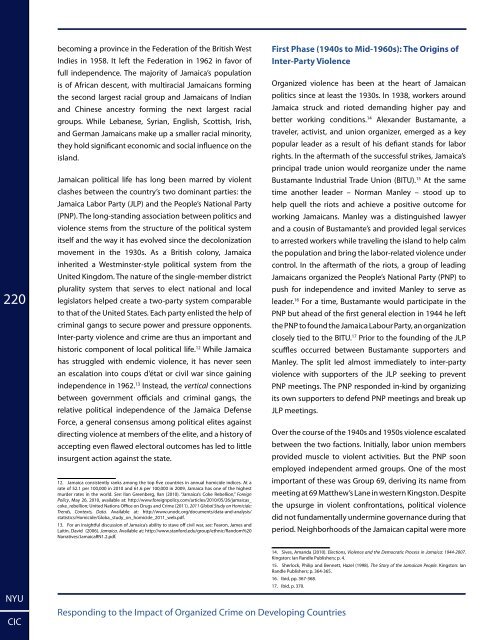Jamaica - Center on International Cooperation
Jamaica - Center on International Cooperation
Jamaica - Center on International Cooperation
You also want an ePaper? Increase the reach of your titles
YUMPU automatically turns print PDFs into web optimized ePapers that Google loves.
220<br />
becoming a province in the Federati<strong>on</strong> of the British West<br />
Indies in 1958. It left the Federati<strong>on</strong> in 1962 in favor of<br />
full independence. The majority of <str<strong>on</strong>g>Jamaica</str<strong>on</strong>g>’s populati<strong>on</strong><br />
is of African descent, with multiracial <str<strong>on</strong>g>Jamaica</str<strong>on</strong>g>ns forming<br />
the sec<strong>on</strong>d largest racial group and <str<strong>on</strong>g>Jamaica</str<strong>on</strong>g>ns of Indian<br />
and Chinese ancestry forming the next largest racial<br />
groups. While Lebanese, Syrian, English, Scottish, Irish,<br />
and German <str<strong>on</strong>g>Jamaica</str<strong>on</strong>g>ns make up a smaller racial minority,<br />
they hold significant ec<strong>on</strong>omic and social influence <strong>on</strong> the<br />
island.<br />
<str<strong>on</strong>g>Jamaica</str<strong>on</strong>g>n political life has l<strong>on</strong>g been marred by violent<br />
clashes between the country’s two dominant parties: the<br />
<str<strong>on</strong>g>Jamaica</str<strong>on</strong>g> Labor Party (JLP) and the People’s Nati<strong>on</strong>al Party<br />
(PNP). The l<strong>on</strong>g-standing associati<strong>on</strong> between politics and<br />
violence stems from the structure of the political system<br />
itself and the way it has evolved since the decol<strong>on</strong>izati<strong>on</strong><br />
movement in the 1930s. As a British col<strong>on</strong>y, <str<strong>on</strong>g>Jamaica</str<strong>on</strong>g><br />
inherited a Westminster-style political system from the<br />
United Kingdom. The nature of the single-member district<br />
plurality system that serves to elect nati<strong>on</strong>al and local<br />
legislators helped create a two-party system comparable<br />
to that of the United States. Each party enlisted the help of<br />
criminal gangs to secure power and pressure opp<strong>on</strong>ents.<br />
Inter-party violence and crime are thus an important and<br />
historic comp<strong>on</strong>ent of local political life. 12 While <str<strong>on</strong>g>Jamaica</str<strong>on</strong>g><br />
has struggled with endemic violence, it has never seen<br />
an escalati<strong>on</strong> into coups d’état or civil war since gaining<br />
independence in 1962. 13 Instead, the vertical c<strong>on</strong>necti<strong>on</strong>s<br />
between government officials and criminal gangs, the<br />
relative political independence of the <str<strong>on</strong>g>Jamaica</str<strong>on</strong>g> Defense<br />
Force, a general c<strong>on</strong>sensus am<strong>on</strong>g political elites against<br />
directing violence at members of the elite, and a history of<br />
accepting even flawed electoral outcomes has led to little<br />
insurgent acti<strong>on</strong> against the state.<br />
12. <str<strong>on</strong>g>Jamaica</str<strong>on</strong>g> c<strong>on</strong>sistently ranks am<strong>on</strong>g the top five countries in annual homicide indices. At a<br />
rate of 52.1 per 100,000 in 2010 and 61.6 per 100,000 in 2009, <str<strong>on</strong>g>Jamaica</str<strong>on</strong>g> has <strong>on</strong>e of the highest<br />
murder rates in the world. See: Ilan Greenberg, Ilan (2010). “<str<strong>on</strong>g>Jamaica</str<strong>on</strong>g>’s Coke Rebelli<strong>on</strong>,” Foreign<br />
Policy, May 26, 2010, available at: http://www.foreignpolicy.com/articles/2010/05/26/jamaicas_<br />
coke_rebelli<strong>on</strong>; United Nati<strong>on</strong>s Office <strong>on</strong> Drugs and Crime (2011). 2011 Global Study <strong>on</strong> Homicide:<br />
Trends, C<strong>on</strong>texts, Data. Available at: http://www.unodc.org/documents/data-and-analysis/<br />
statistics/Homicide/Globa_study_<strong>on</strong>_homicide_2011_web.pdf.<br />
13. For an insightful discussi<strong>on</strong> of <str<strong>on</strong>g>Jamaica</str<strong>on</strong>g>’s ability to stave off civil war, see: Fear<strong>on</strong>, James and<br />
Laitin, David (2006). <str<strong>on</strong>g>Jamaica</str<strong>on</strong>g>. Available at: http://www.stanford.edu/group/ethnic/Random%20<br />
Narratives/<str<strong>on</strong>g>Jamaica</str<strong>on</strong>g>RN1.2.pdf.<br />
First Phase (1940s to Mid-1960s): The Origins of<br />
Inter-Party Violence<br />
Organized violence has been at the heart of <str<strong>on</strong>g>Jamaica</str<strong>on</strong>g>n<br />
politics since at least the 1930s. In 1938, workers around<br />
<str<strong>on</strong>g>Jamaica</str<strong>on</strong>g> struck and rioted demanding higher pay and<br />
better working c<strong>on</strong>diti<strong>on</strong>s. 14 Alexander Bustamante, a<br />
traveler, activist, and uni<strong>on</strong> organizer, emerged as a key<br />
popular leader as a result of his defiant stands for labor<br />
rights. In the aftermath of the successful strikes, <str<strong>on</strong>g>Jamaica</str<strong>on</strong>g>’s<br />
principal trade uni<strong>on</strong> would reorganize under the name<br />
Bustamante Industrial Trade Uni<strong>on</strong> (BITU). 15 At the same<br />
time another leader – Norman Manley – stood up to<br />
help quell the riots and achieve a positive outcome for<br />
working <str<strong>on</strong>g>Jamaica</str<strong>on</strong>g>ns. Manley was a distinguished lawyer<br />
and a cousin of Bustamante’s and provided legal services<br />
to arrested workers while traveling the island to help calm<br />
the populati<strong>on</strong> and bring the labor-related violence under<br />
c<strong>on</strong>trol. In the aftermath of the riots, a group of leading<br />
<str<strong>on</strong>g>Jamaica</str<strong>on</strong>g>ns organized the People’s Nati<strong>on</strong>al Party (PNP) to<br />
push for independence and invited Manley to serve as<br />
leader. 16 For a time, Bustamante would participate in the<br />
PNP but ahead of the first general electi<strong>on</strong> in 1944 he left<br />
the PNP to found the <str<strong>on</strong>g>Jamaica</str<strong>on</strong>g> Labour Party, an organizati<strong>on</strong><br />
closely tied to the BITU. 17 Prior to the founding of the JLP<br />
scuffles occurred between Bustamante supporters and<br />
Manley. The split led almost immediately to inter-party<br />
violence with supporters of the JLP seeking to prevent<br />
PNP meetings. The PNP resp<strong>on</strong>ded in-kind by organizing<br />
its own supporters to defend PNP meetings and break up<br />
JLP meetings.<br />
Over the course of the 1940s and 1950s violence escalated<br />
between the two facti<strong>on</strong>s. Initially, labor uni<strong>on</strong> members<br />
provided muscle to violent activities. But the PNP so<strong>on</strong><br />
employed independent armed groups. One of the most<br />
important of these was Group 69, deriving its name from<br />
meeting at 69 Matthew’s Lane in western Kingst<strong>on</strong>. Despite<br />
the upsurge in violent c<strong>on</strong>fr<strong>on</strong>tati<strong>on</strong>s, political violence<br />
did not fundamentally undermine governance during that<br />
period. Neighborhoods of the <str<strong>on</strong>g>Jamaica</str<strong>on</strong>g>n capital were more<br />
NYU<br />
CIC<br />
Resp<strong>on</strong>ding to the Impact of Organized Crime <strong>on</strong> Developing Countries<br />
14. Sives, Amanda (2010). Electi<strong>on</strong>s, Violence and the Democratic Process in <str<strong>on</strong>g>Jamaica</str<strong>on</strong>g>: 1944-2007.<br />
Kingst<strong>on</strong>: Ian Randle Publishers; p. 4.<br />
15. Sherlock, Philip and Bennett, Hazel (1998). The Story of the <str<strong>on</strong>g>Jamaica</str<strong>on</strong>g>n People. Kingst<strong>on</strong>: Ian<br />
Randle Publishers; p. 364-365.<br />
16. Ibid, pp. 367-368.<br />
17. Ibid, p. 370.
















